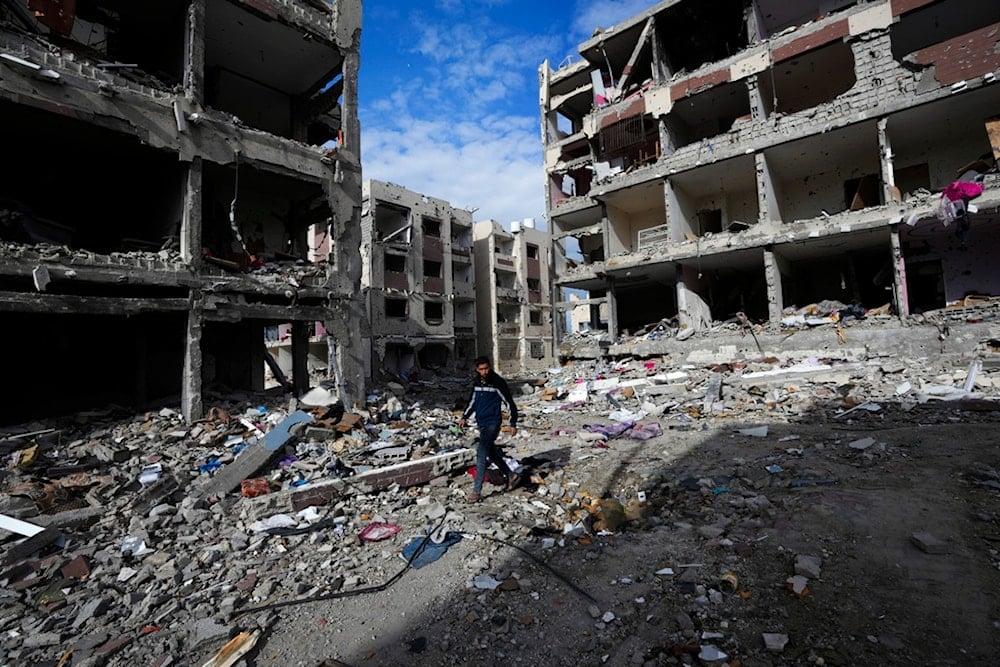Public Israeli stance contradicts negotiators in Doha talks: WSJ
The release of some captives has increased pressure to allow negotiations to proceed, but Netanyahu also confronts the risk of a revolt within his ruling coalition if he pursues an extended ceasefire.
-

Palestinians visit their houses destroyed in the Israeli bombings southeast of the Gaza City on Tuesday, Nov. 28, 2023. on the fifth day of the temporary ceasefire between the resistance and the Israeli regime (AP)
Wall Street Journal reported on Wednesday, citing an Israeli official, that "Israel" is willing to engage in new talks for the release of Israeli men and soldiers held in Gaza. However, this willingness is contingent upon the prior release of all women and children captives.
This suggests the possibility of an extension of the current truce beyond this week. Despite this, the Israeli regime asserts its preparedness to resume its aggression if deemed necessary.
Opposition to Permanent Ceasefire
Israeli leaders have strongly opposed the idea of a permanent ceasefire, highlighting the regime's dilemma as it grapples with the conflicting desire of the settler population to annihilate the Palestinian resistance while also seeking the release of approximately 200 individuals captured on October 7.
"There is no situation in which we do not go back to fighting until the end. This is my policy. The entire security cabinet is behind it. The entire government is behind it. The soldiers are behind it. The people are behind it—this is exactly what we will do," said Netanyahu on Wednesday.
The exchange of some captives has increased pressure to allow negotiations to proceed, but Netanyahu also confronts the risk of a revolt within his ruling coalition if he pursues an extended ceasefire.
"Stopping the war = breaking apart the government," said Itamar Ben-Gvir, "Israel’s" security minister and one of Netanyahu’s primary coalition partners.
Read more: War on Gaza hampers Gulf countries and "Israel" normalization: WashPo
Contrasting Stances in Doha Talks
The confrontational public stance stands in contrast to the more receptive posture of Israeli negotiators in Doha. During talks, participants revealed that Israeli intelligence chief David Barnea and others attentively considered various proposals, including the notion of a permanent cease-fire, without outright rejection. Although the existing ceasefire is scheduled to conclude at 7 a.m. local time on Thursday, negotiators are actively working to extend it for a few more days to facilitate the release of additional captives.
Once the remaining Israeli women, children, and elderly are released, the possibility of freeing over 100 Israeli men, deemed of fighting age by the resistance, emerges. This group includes active-duty or reservist soldiers. In exchange for their release, the resistance is likely to demand the freedom of thousands of Palestinian prisoners from Israeli jails and may seek an extended or even permanent ceasefire, as indicated by negotiators.
Read more: Lieberman: A long term ceasefire is effectively a Hamas victory
Biden Administration's Shifting Stance
The Israeli regime grapples with its dilemma amid a notable shift in the Biden administration's stance, which increasingly urges "Israel" to curtail its attacks on Gaza to prevent significant civilian casualties.
President Biden, confronting criticism within the Democratic Party regarding his policy on the conflict, issued a statement that some commentators interpreted as a plea to bring an end to the war after nearly two months of fighting.
"To continue down the path of terror, violence, killing, and war is to give Hamas what they seek," he posted on X, formerly Twitter, late on Tuesday, US time.

 3 Min Read
3 Min Read








